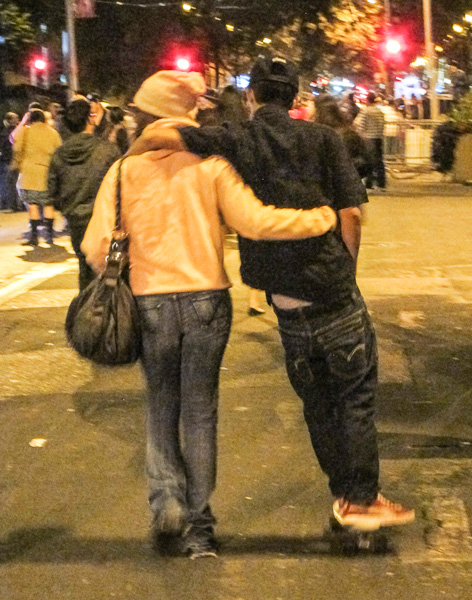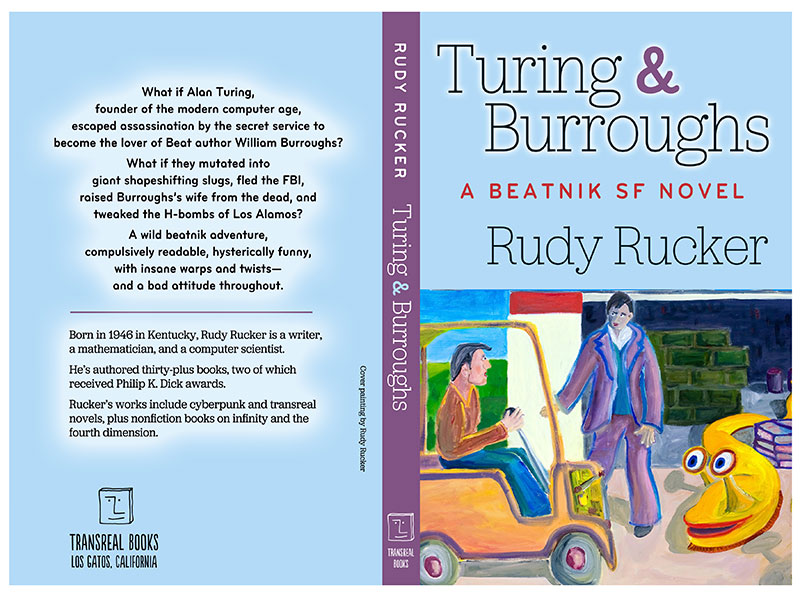This week I read a free Creative Commons licensed version of a novel on my Kindle. And that set me to thinking that I should do a CC release of Turing & Burroughs. In the past, I’ve done this for some of my other books—Postsingular and The Ware Tetralogy. My experience is that, in today’s odd post-crash potlatch iterary economy, doing a CC doesn’t seem to hurt my sales.
So I posted some free CC versions of the new book, see the link on the Turing & Burroughs page. Dig in and snarf ’em up, but don’t let that stop you from buying the book! Keep in mind that Transreal Books does have a nice paperback edition of the novel as well as commercial Kindle, NOOK, EPUB and MOBI editions. At present the paperbacks are only on Amazon, but in a month or so they should be on the other book sites and even in some physical bookstores. In time for Xmas.
By the way, Turing & Burroughs got a great review by Autodesk founder and computer maniac John Walker.

Anyway, the catalyzing book that I was reading in a CC edition this week was Cory Doctorow and Charles Stross’s long-awaited Rapture of the Nerds . It’s great fun, very clever and postsingular. The cloud of simulated minds living in outer-space dust is a real place now, an accepted SF trope. The novel resets the bar of what one expects from an SF novel—indeed, for an SF writer, it’s a bit daunting to read. And, rather than being a straight-on geek-fest, the book gains transreal richness by getting into the main character’s issues with his/her parents. (Gender is mutable in the postsinglar world.)
The style of Rapture of the Nerds is at times very beautiful. Just at random, here’s a sentence from Rapture of the Nerds that I really loved—I’ve always been fond of odd lists crafted in the manner of Jorge-Luis Borges.
Out the window, where there should be iron gray Welsh sky and the crashing sea, there is, instead, a horizon-spanning skybox hung with ornament-sized pieces of reality, hung in serried ranks: trees, houses, buildings, people, livestock, CO2, rare earths, bad ideas, literary criticism, children’s books, food additives, tumbleweeds, blips, microorganisms, lamentable fashion, copy editors’ marks, pulsars, flint axes, cave drawings, mind-numbingly complex mathematical proofs, van art, mountains, molehills, uplifted ant colonies.
Yeah, baby!
I’m so glad to have Stross and Doctorow around. They keep the game interesting.
Moving on, I also want to discuss some ideas about telepathy and the possible shock thereof.
Some of the characters in Turing & Burroughs have telepathy with each other, and they don’t find it that disturbing. And in Rapture of Nurbs, the characters handle greatly expanded states of consciousness fairly easily as well. But I’m thinking that, in my next novel, The Big Aha, I think telepathy will be treated as something that’s more disorienting, at least initially, than we SF writers usually admit.
My ideas along these lines relate to something I was pondering this past weekend at the Phil Dick Fest. I have a long-standing peeve about consensus history—our rulers’ “history” is all about politicians, fat cats, nobles, and wars. But the consensus history you learn in school is only one path through the superspace of human thought, one threaded traversal of the mindscape.

In reality, each of us has our unique version of history. And so does a grain of sand or a bird or a table leg (getting into my Hylozoic trip of every object in the world having a mind). And if you were sufficiently telepathic, thanks to, let’s say, quantum wetware, you’d get an awareness of all the life stories and the whole block of the mindscape.
And this effect would be a big aha—or at least he start of one.
How will the big aha feel? You might, at least initially, be incapacitated, or you might find some way to deal. I’m thinking about this in terms of writing an SF novel. And I do know that the merging with all minds thing has been done. So I’d like to find a fresh angle. I’ll list some of the possible effects of the telepathy-big-aha on the visionary, all of which have been used, but some of which seem more amenable to being used again.

Odd-ball twist: the visionary becomes a chimera with body parts from other beings. Would be good to mix some of this in, it’s good to have a funky, meaty objective correlative for the fanciful abstract mind state. Maybe my character oey Moon undergoes this when he has a fit of telepathy fueled higher consciousness. Would be a tasty scene.

A “roving I” montage where you flip through different points of view. Recently I read this as the “Transplant” sequence in Robert Sheckley’s Immortality Incorporated, and I think I did something like this in Frek and the Elixir. But I’m not sure this can be made interesting again. It’s dull and stale if you just start cataloging a sequence of random bizarre points of view. At the very least you’d want a metastory thread connecting the points of view.

A mystical white light blank-out—this is coma thing.
Slightly less incapacitating: an omniscient mind-lift to a god-like and synoptic Hilbert Space viewpoint. I did some of this with my “Big Pig” scenes in Hylozoic.
A hive mind synergy where you’re working with the minds around you. People hate the idea of hive minds, of course. Un-American! (Of course any society really is a hive mind.)

But instead of a hive mind we talk about a network of hubs where each of us is reaching out and assimilating the other viewpoints while still holding our own.
I like the network image best for a telepathy-big-aha story. I was getting into this frame of mind sitting in a field up on a hill near my house at dusk the other day. Imagining I was “in” the trees around me, in the rocks, in the deer wandering around (a small herd lives up there). Although I was reaching out into the other mind flows. I was still an integrative center. As if the other minds were webpages I was browsing on multiple screen, while I’m still being me in my Aeron office chair as it were.

Keep in mind that any scene involving exalted telepathic states can quickly founder on the reader’s impatient question: “So what?” The whole interest of a character is that they embody a specific point of view. It’s important to keep the individuality even if my character is teeping a lot of stuff around him.
I’m also thinking that, after the telepathy-big-aha, I’ll have to move on to a stronger marvel. Giant ants? Branching time? Transdimensional aliens? A cloud of nants? Another run at hylozoism, where every natural object gets a mind? Or something unheard of.
I’ll keep pushing on it, and see where the Muse takes me.
Meanwhile, check out Turing & Burroughs!










October 2nd, 2012 at 9:06 pm
I strikes me how dumb and mundane most SF stories with telepathy make it out to be. One would imagine first mental contact to be at least as awkward, exciting and terrifying as losing your virginity, especially if it came unbidden. It would be incredibly intimate – completely outside of anyone’s experience – and the experience itself could make a person feel violated and insecure.
October 6th, 2012 at 11:11 am
It is interesting to see an attempt to have a different take on the “telepathy”-circus. It seems to me sorely needed. In most novels I have read it’s regarded as the classical two-way link without any particular interference. This is, of course, an interesting plaything.. But I’ve always thought that to introduce the concepts of environmental noise, “multi-user”-interference, and pre-conscious decompression/interpretation in explorations of the theme to be more interesting than the classical view of “truthful” person to person communication.
Good luck with that, though. Turing and Burroughs seems to be (from the excerpts i read in Flurb) as close as i can get to what i’m thinking of.
Other than that, giant ants? Oh well, I’ll have to go and look in my uncle’s basement in Paris. Even though he’s told me not to…. (A book i haven’t read, but whose outline is still more than sufficient for vague allusions….)
Or, on another note, the finishing paragraph from the short story “Talk” from Harper’s Magazine (December, 1921)
“I think Maclay and I both had the same idea instantly. But not until Bissell had vanished through the heavy doors did either of us lean forward for the manuscript. I got it first and took it up with curious fingers. The title page was clear before me. “The Wonder Story of the Ants”, I read, “With introduction by Henri Fabre.”
“By God! they can’t talk!” Floyd Bissell had written boldly across the page.
October 11th, 2012 at 12:25 pm
I’ve been really enjoying “Rapture of the Nerds,” which I found reminiscent of some of your work (in a good way).